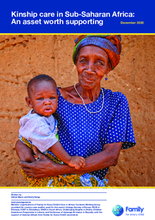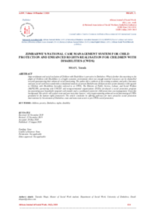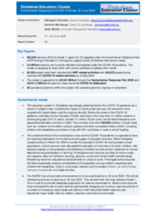Displaying 21 - 30 of 136
In this How We Care series, Family for Every Child presents the programming of three CSOs on how they are supporting kin carers and the vulnerable children in their care, in their respective regions.
This paper argues that kinship care – the care of children by relatives or friends of the family – represents the greatest resource available for meeting the needs of girls and boys who are orphaned or otherwise live apart from their parents.
The author of this study did a synthesis of the existing academic and policy literature and uses social work lens to undertake a situational analysis of current Zimbabwean child protection system dynamics with regards to Children with Disabilities hereafter referred to as CWDs.
This report outlines the peer research approach adopted by the Building Positive Futures project and summarises the findings of the pilot of the peer research methodology on leaving care in Africa.
This report is a short summary of the main findings from 'Building Positive Futures: A Cross-Country Pilot Study on Youth Transitions from Out-of-Home Care in Africa,' written for youth who participated and other interested young people.
Given the paucity of research on youth transitioning from alternative care (i.e. care-leaving or leaving care) in Africa, the study sought to develop and test a methodology for a cross-country, comparative study on leaving care in Africa.
This paper investigates whether the Government of Zimbabwe’s Harmonized Social Cash Transfer (HSCT) Program, which combines cash transfers with complementary services, affects youth exposure to physical violence.
This brief from the Zimbabwe Education Cluster presents details on the humanitarian needs and response in Zimbabwe due to the COVID-19 crisis, including the acute needs of orphans and vulnerable children, children with disabilities, and others.
This article is a qualitative phenomenological study seeking to examine the perceptions, views and feelings of the orphans and vulnerable children (OVC), care-givers and community leaders on their experiences with Basic Education Assistance Module (BEAM) as a material and psychosocial support intervention in Zimbabwe.
This qualitative study used a case study design to explore the manifestations of the core psycho-social deficits associated with children domiciled in child headed households.






